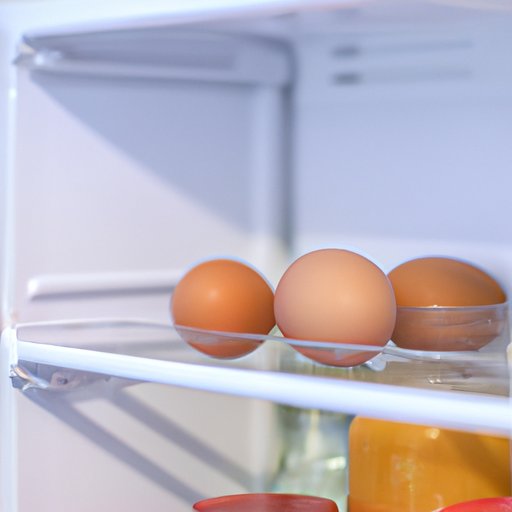Introduction
Eggs are a versatile food that can be used in a variety of dishes. They’re also an excellent source of protein, vitamins, and minerals. But how long do eggs stay fresh in the refrigerator? That’s a common question among those who purchase them.
How Long Can You Store Eggs in the Refrigerator?
When it comes to storing eggs in the refrigerator, there are a few best practices to keep in mind. First, eggs should always be refrigerated immediately after purchase. This will help prevent bacterial growth and ensure that your eggs remain as fresh as possible for as long as possible.
In addition to purchasing eggs from a reputable source, there are several factors that can affect the shelf life of eggs in the fridge. Temperature is one of the most important factors, as eggs should be stored at or below 40°F (4°C). Humidity levels should also be monitored, as high humidity can lead to spoilage. Finally, proper ventilation is essential, as air circulation helps to keep eggs fresher longer.
How to Tell If Eggs Are Still Fresh After Being Stored in the Fridge
If you’re unsure whether your eggs are still safe to eat after being stored in the refrigerator, there are a few methods you can use to check their freshness. The first is a visual inspection: look for any signs of cracking or discoloration. If the eggshell appears cracked or discolored, discard it.
You can also perform a smell test: if the egg has a strong odor, it’s likely spoiled and should be discarded. Finally, you can try the float test: place the egg in a bowl of cold water. If the egg sinks to the bottom, it’s still good; if it floats, it should be discarded.
How Long Do Eggs Last in the Refrigerator?
The average shelf life of eggs in the refrigerator is approximately three to five weeks. However, this can vary depending on a number of factors, including the type of egg (white vs. brown), the temperature of the refrigerator, and the age of the egg. In general, the fresher the egg, the longer it will last in the fridge.
It’s also important to note that the expiration date printed on the carton may not necessarily be accurate. While it’s a good guideline, it’s best to use your own judgment when deciding whether or not to consume the eggs.
What is the Shelf Life of Eggs in the Refrigerator?
The recommended storage time for eggs in the refrigerator is three to five weeks. To maximize the shelf life of eggs in the fridge, store them in the original carton away from other foods and make sure the temperature is set to 40°F (4°C) or lower. Additionally, it’s important to avoid exposing eggs to extreme temperature fluctuations, as this can cause them to spoil faster.

Tips on Keeping Eggs Fresh in the Refrigerator
To ensure that eggs remain fresh in the refrigerator, it’s important to maintain a proper temperature and humidity. The ideal temperature is 40°F (4°C) or lower, while the ideal humidity is between 75-80%. Additionally, it’s important to keep the storage containers clean, as dirt and bacteria can cause eggs to spoil faster.
It’s also important to avoid cross-contamination by keeping raw and cooked eggs separate. For example, if you’re using raw eggs in a recipe, make sure to use a separate bowl and utensils from those used for cooked eggs.

Storage Guidelines for Eggs in the Fridge
When storing eggs in the refrigerator, it’s important to keep the temperature at or below 40°F (4°C). Additionally, it’s best to store eggs away from other foods, as this can help reduce the risk of cross-contamination. When freezing eggs, make sure to use airtight containers, as this will help maintain their quality.

How to Maximize the Shelf Life of Eggs in the Refrigerator
To maximize the shelf life of eggs in the refrigerator, start by choosing the freshest eggs possible. Look for eggs with intact shells and no cracks or discoloration. Additionally, make sure to refrigerate eggs immediately after purchase and discard any cracked or broken eggs.
Conclusion
When it comes to storing eggs in the refrigerator, there are a few best practices to keep in mind. Make sure to purchase eggs from a reputable source, refrigerate them immediately after purchase, and store them at or below 40°F (4°C). Additionally, you can use the visual inspection, smell test, and float test to determine whether or not eggs are still fresh. On average, eggs will last three to five weeks in the refrigerator. Finally, remember to choose the freshest eggs possible, refrigerate them immediately after purchase, and discard any cracked or broken eggs.


